There is an epidemic of sexual violence on America's college campuses, according to some researchers. Sky News travelled to Ohio, home to several large universities and a huge student population, to find out more.
It's a notoriously hard thing to measure but one estimate suggests that as many as one in four students will be subjected to a serious sexual assault before they graduate.
I was expecting it to be quite hard to get students to talk to me about such a sensitive subject.
But I was taken aback at how candid they were, particularly about how the mix of alcohol and risk-taking makes them vulnerable, and why consent is nowhere near as straightforward as it should be.
"It happens I feel like, and then the next day you're like, 'well wait, did I say yes?'," said one young woman.
Student Shelby Ebert said: "I think the biggest problem we have on campus is drinking too much and having sex, and then you're like 'oh, I probably shouldn't have done that', you know? And then you're like 'do you consent when you're drunk'? Is that consent?"

In a bar near one campus we are told over and over again that the #metoo movement has not had enough impact on attitudes and behaviour among the student population.
Student Dani Ouro said: "In my experience when I go out, men are touching your ass, they're trying to grab you, they are trying to take you home."
Another added: "I've had friends that wake up the next morning and they remember saying that they didn't want to have sex with someone and they woke up with no clothes on."
The next day we stopped to talk to a group of friends having lunch in the shade under a tree.
 1:20
1:20They explained how they felt the threat of being harassed or assaulted was almost ever-present, especially out at night.
They described avoiding certain bars where packed crowds hid wandering hands, and how in other places or parties they would put buddy systems in place so no-one could be singled out and targeted.
Student Brianna Cotton said: "Just off the top of my head I can think of 10 different women who I know within my friend group who have experienced some form of sexual assault."
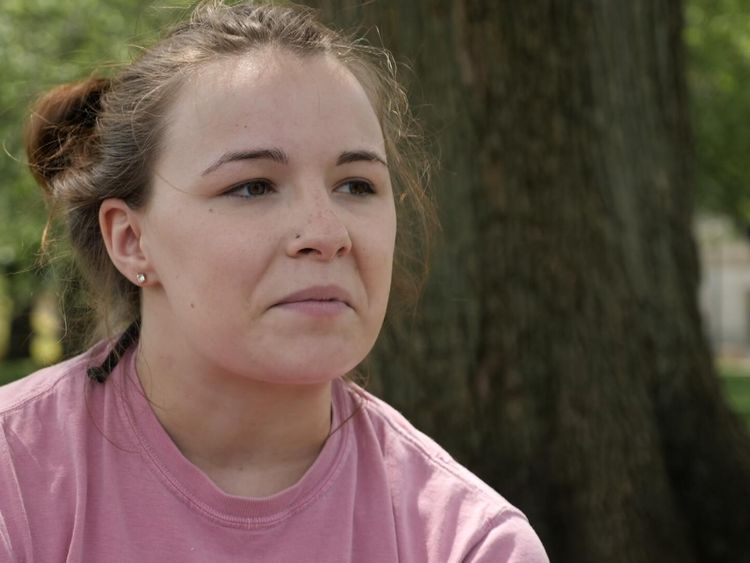
Then she revealed that last year she had also been assaulted, couldn't bring herself to report it, and as with so many survivors, still wonders if it might have been her fault.
I asked her why she had not come forward.
She said: "At the time, I feel like the stigma caused me not to.
"The whole, like 'what were you wearing' thing, and that particular night I was wearing a lower-cut shirt; I had been drinking, not an excessive amount but I was for sure drunk on the night that it happened.
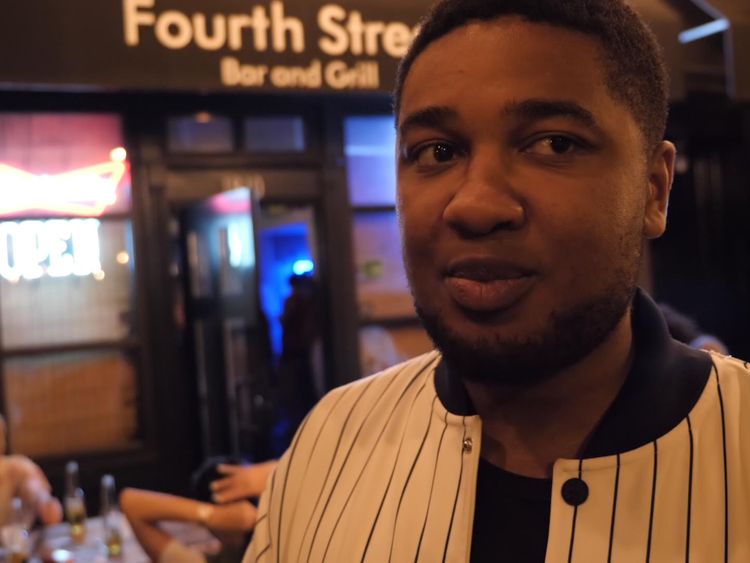
"I only remember bits and pieces, so then you start to question it – maybe I did consent initially? And maybe it was lost in translation… It's their word verses yours at that point."
Terra Purdy works at the sexual violence crisis clinic that covers several of the big universities in Ohio
She says that campus culture can reinforce the damaging idea that young women are somehow to blame for being vulnerable.
"People get raped because there's a rapist, is what I usually say.
"We don't ask people who have been mugged, 'why were you at the ATM? You got out money so you must have been asking for it', but we do say to victims of sexual assault 'why was your skirt so short? Why were you out at night walking alone?'
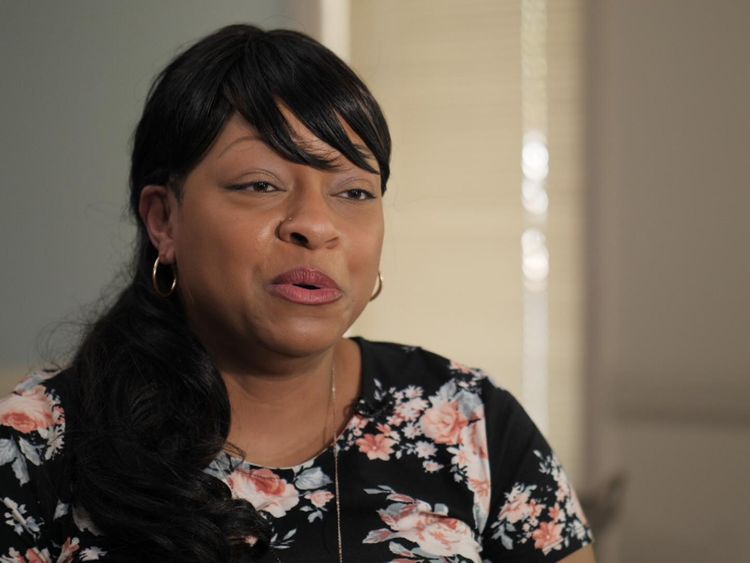
"It has to change."
Just down the road at Antioch College they have long taken a radical approach to preventing sexual offences
Here, any touch requires clear enthusiastic verbal permission, a policy called affirmative consent.
Student Alexandria Montgomery said: "At every step of physical contact you ask for consent. So let's say I'm hanging out with someone and let's say I have a crush, I'll say 'can I kiss you, can I touch you there, can I hold your hand, can I touch your thigh, is this okay, do you feel okay with this?'"
For many among this small campus community, the rules have extended as far as shaking hands, or touching someone on the arm.
Psychology student Alana Guth said: "It makes me feel respected more, at least my personal space is being respected.
"When I'm outside of Antioch, and someone comes up and pats my shoulder just absent minded, I feel well, you know, I didn't ask for that.
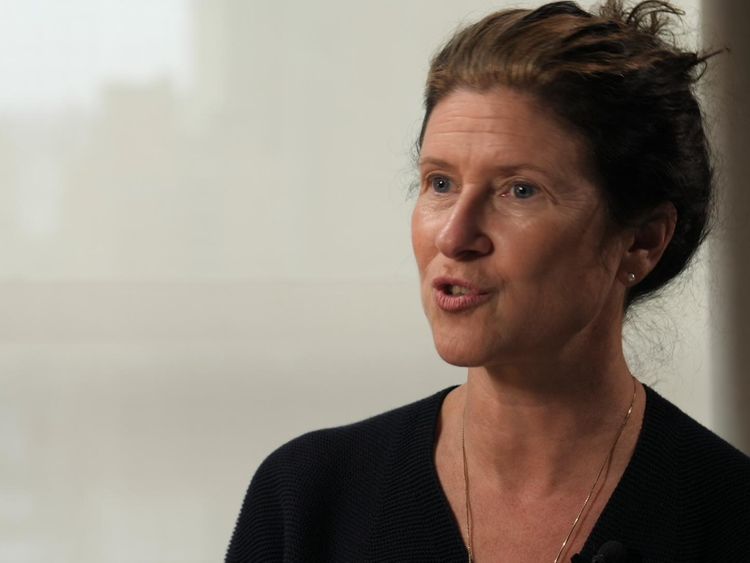
"I really appreciate when people don't just assume that they can come into your space."
I ask student Noah Reveley-Hunt whether this is political correctness gone mad, and if intimacy and spontaneity have been legislated into oblivion.
He laughs.
"At first I thought it was a little funny that sort of every interaction was dictated by this yes or no consent, you know patting someone on the shoulder, but now I'm like 'oh yeah, that makes total sense, absolutely makes total sense'.
"I wanna know that someone's into what I'm doing before I do anything, because that's not sexy; if the other person's not into it, I'm not into it either."
It has been this way at Antioch since the early 90s when a group of female students wrote a manifesto on consent in response to a rape on campus.
In the university archive, they have kept a record of how the Antioch rules, as they were called, were mocked all over the world, even immortalised on a Saturday Night Live sketch.
Bethany Saltman was one of the original authors.
She said: "I mean to me it's so obvious, it's so not a big deal, it's like instead of 'did she say no, did you ask?' It's just a flip of the switch, which so many great ideas are."
Nearly three decades later, versions of the Antioch rules have become commonplace on campuses across the country, sparking fierce debate about whether universities are going too far in their scramble to solve the problem

Lawyer Andrew Miltenberg has defended hundreds of accused young men who find themselves investigated by colleges – whether or not the police are involved.
He said: "I think it's a very dangerous time to be a young man on campus.
"We are in the midst of this perfect storm, where to be accused of some sort of sexual misconduct virtually assures that you will be found responsible.
"It is absolutely, positively ruining people's lives, beyond repair."
He says his clients are trapped in a shadow justice system – with no consistency at all between schools, low standards of evidence often required to make decisions, and a lack of regard for due process.
"If you are found responsible, whether or not you are suspended or expelled there will be a permanent record of disciplinary and in many cases sexual misconduct on your transcript, and that transcript is a perquisite to any type of graduate school and it's also a perquisite for any professional-type jobs.
"So the stakes are very high."
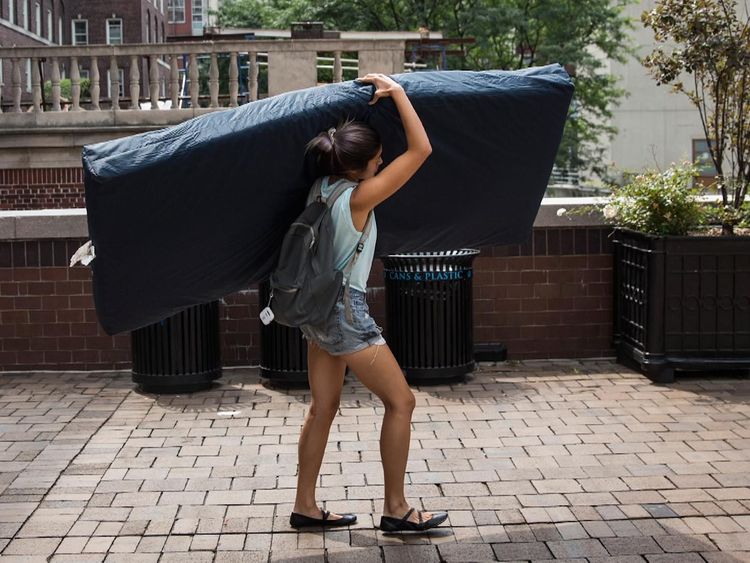
I met one young man, who did not want to be identified, who said that the climate on campus means even an accusation is enough to change everything.
After a student accused him of rape he was investigated and cleared three times – once by the police and twice by the university.
But he says the college assumed he was guilty, and the process violated his civil rights.
In the end, he left university.
He said: "I would walk down one of the little walk ways in the school and then I would hear 'he's a rapist', with pointing and everything.
"For people to assume that kind of thing about me was really hard to deal with."
But for others the system is failing because it's not robust enough.
Emma Sulkowicz accused a man of rape, and then carried a mattress around campus in protest at the subsequent complicated, drawn-out investigation.
The art student became the face of the campus survivors' movement and insists that for everyone's sake the police should not be the only option.
"Survivors who were assaulted in university, part of why they would rather the university handle it than the police department is that they feel like often the crime was committed because their attacker wasn't educated on consent."
There are around 20 million students at colleges across America and in a few weeks' time, they will all return to class.
Around them swirls a heated legal and political battle about the limits and responsibilities of the schools they attend.
More from US
The Trump administration has already been accused of rolling back protections for survivors, while groups campaigning on behalf of accused students say it has not gone far enough.
For now, colleges await new, permanent guidelines from the government, leaving an imperfect system to deal with a crisis.
There is an epidemic of sexual violence on America's college campuses, according to some researchers. Sky News travelled to Ohio, home to several large universities and a huge student population, to find out more.
It's a notoriously hard thing to measure but one estimate suggests that as many as one in four students will be subjected to a serious sexual assault before they graduate.
I was expecting it to be quite hard to get students to talk to me about such a sensitive subject.
But I was taken aback at how candid they were, particularly about how the mix of alcohol and risk-taking makes them vulnerable, and why consent is nowhere near as straightforward as it should be.
"It happens I feel like, and then the next day you're like, 'well wait, did I say yes?'," said one young woman.
Student Shelby Ebert said: "I think the biggest problem we have on campus is drinking too much and having sex, and then you're like 'oh, I probably shouldn't have done that', you know? And then you're like 'do you consent when you're drunk'? Is that consent?"

In a bar near one campus we are told over and over again that the #metoo movement has not had enough impact on attitudes and behaviour among the student population.
Student Dani Ouro said: "In my experience when I go out, men are touching your ass, they're trying to grab you, they are trying to take you home."
Another added: "I've had friends that wake up the next morning and they remember saying that they didn't want to have sex with someone and they woke up with no clothes on."
The next day we stopped to talk to a group of friends having lunch in the shade under a tree.
 1:20
1:20They explained how they felt the threat of being harassed or assaulted was almost ever-present, especially out at night.
They described avoiding certain bars where packed crowds hid wandering hands, and how in other places or parties they would put buddy systems in place so no-one could be singled out and targeted.
Student Brianna Cotton said: "Just off the top of my head I can think of 10 different women who I know within my friend group who have experienced some form of sexual assault."

Then she revealed that last year she had also been assaulted, couldn't bring herself to report it, and as with so many survivors, still wonders if it might have been her fault.
I asked her why she had not come forward.
She said: "At the time, I feel like the stigma caused me not to.
"The whole, like 'what were you wearing' thing, and that particular night I was wearing a lower-cut shirt; I had been drinking, not an excessive amount but I was for sure drunk on the night that it happened.

"I only remember bits and pieces, so then you start to question it – maybe I did consent initially? And maybe it was lost in translation… It's their word verses yours at that point."
Terra Purdy works at the sexual violence crisis clinic that covers several of the big universities in Ohio
She says that campus culture can reinforce the damaging idea that young women are somehow to blame for being vulnerable.
"People get raped because there's a rapist, is what I usually say.
"We don't ask people who have been mugged, 'why were you at the ATM? You got out money so you must have been asking for it', but we do say to victims of sexual assault 'why was your skirt so short? Why were you out at night walking alone?'

"It has to change."
Just down the road at Antioch College they have long taken a radical approach to preventing sexual offences
Here, any touch requires clear enthusiastic verbal permission, a policy called affirmative consent.
Student Alexandria Montgomery said: "At every step of physical contact you ask for consent. So let's say I'm hanging out with someone and let's say I have a crush, I'll say 'can I kiss you, can I touch you there, can I hold your hand, can I touch your thigh, is this okay, do you feel okay with this?'"
For many among this small campus community, the rules have extended as far as shaking hands, or touching someone on the arm.
Psychology student Alana Guth said: "It makes me feel respected more, at least my personal space is being respected.
"When I'm outside of Antioch, and someone comes up and pats my shoulder just absent minded, I feel well, you know, I didn't ask for that.

"I really appreciate when people don't just assume that they can come into your space."
I ask student Noah Reveley-Hunt whether this is political correctness gone mad, and if intimacy and spontaneity have been legislated into oblivion.
He laughs.
"At first I thought it was a little funny that sort of every interaction was dictated by this yes or no consent, you know patting someone on the shoulder, but now I'm like 'oh yeah, that makes total sense, absolutely makes total sense'.
"I wanna know that someone's into what I'm doing before I do anything, because that's not sexy; if the other person's not into it, I'm not into it either."
It has been this way at Antioch since the early 90s when a group of female students wrote a manifesto on consent in response to a rape on campus.
In the university archive, they have kept a record of how the Antioch rules, as they were called, were mocked all over the world, even immortalised on a Saturday Night Live sketch.
Bethany Saltman was one of the original authors.
She said: "I mean to me it's so obvious, it's so not a big deal, it's like instead of 'did she say no, did you ask?' It's just a flip of the switch, which so many great ideas are."
Nearly three decades later, versions of the Antioch rules have become commonplace on campuses across the country, sparking fierce debate about whether universities are going too far in their scramble to solve the problem

Lawyer Andrew Miltenberg has defended hundreds of accused young men who find themselves investigated by colleges – whether or not the police are involved.
He said: "I think it's a very dangerous time to be a young man on campus.
"We are in the midst of this perfect storm, where to be accused of some sort of sexual misconduct virtually assures that you will be found responsible.
"It is absolutely, positively ruining people's lives, beyond repair."
He says his clients are trapped in a shadow justice system – with no consistency at all between schools, low standards of evidence often required to make decisions, and a lack of regard for due process.
"If you are found responsible, whether or not you are suspended or expelled there will be a permanent record of disciplinary and in many cases sexual misconduct on your transcript, and that transcript is a perquisite to any type of graduate school and it's also a perquisite for any professional-type jobs.
"So the stakes are very high."

I met one young man, who did not want to be identified, who said that the climate on campus means even an accusation is enough to change everything.
After a student accused him of rape he was investigated and cleared three times – once by the police and twice by the university.
But he says the college assumed he was guilty, and the process violated his civil rights.
In the end, he left university.
He said: "I would walk down one of the little walk ways in the school and then I would hear 'he's a rapist', with pointing and everything.
"For people to assume that kind of thing about me was really hard to deal with."
But for others the system is failing because it's not robust enough.
Emma Sulkowicz accused a man of rape, and then carried a mattress around campus in protest at the subsequent complicated, drawn-out investigation.
The art student became the face of the campus survivors' movement and insists that for everyone's sake the police should not be the only option.
"Survivors who were assaulted in university, part of why they would rather the university handle it than the police department is that they feel like often the crime was committed because their attacker wasn't educated on consent."
There are around 20 million students at colleges across America and in a few weeks' time, they will all return to class.
Around them swirls a heated legal and political battle about the limits and responsibilities of the schools they attend.
More from US
The Trump administration has already been accused of rolling back protections for survivors, while groups campaigning on behalf of accused students say it has not gone far enough.
For now, colleges await new, permanent guidelines from the government, leaving an imperfect system to deal with a crisis.










